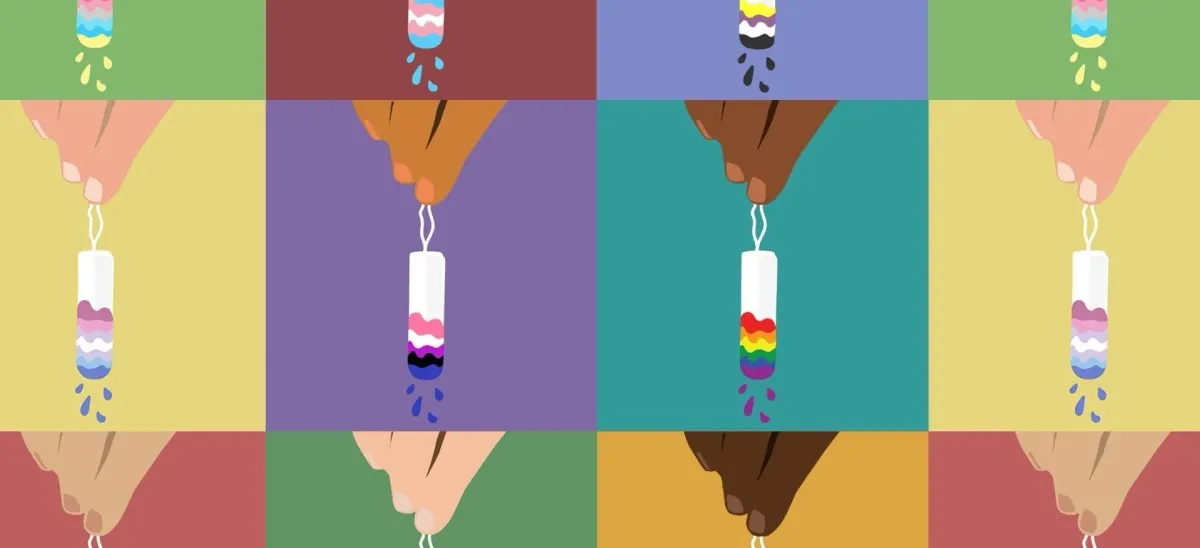Why the Period Positivity Movement Can Be Toxic for Some
The ‘Period Positivity’ movement is creating space for more open and honest discussions about periods, but for some, menstruation can be a traumatic experience - which is why Natracare is encouraging a more nuanced conversation.

Access the Audio Read version of this article directly on Spotify for Podcasters.
“Conversations about menstruation are too often gendered in the ‘period positive’ space, which excludes the experiences of people who aren’t cisgendered women. Trans men, intersex, genderqueer and nonbinary people have periods too.”
SPONSORED BY NATRACARE
‘Period Positivity’ is a progressive movement for many, and in the last few years, we’re seeing more conversations than ever about periods. You only have to quickly flick through a social media feed and women’s weeklies to see post upon post dedicated to topics surrounding menstruation, including how it relates to further social and environmental issues. These taboo topics are finally allowing half of the population to confidently ask questions and seek the right answers about their periods.
As a society, it’s imperative to work towards destigmatising periods by having these open discussions about period health, pollution, and poverty – and without a doubt, this movement has helped to achieve this. However, as ‘period positivity’ continues to spread across the mainstream, some of these conversations may be – unintentionally – exclusionary for some.
What is Toxic Period Positivity?
Have you ever read a headline like: ‘7 ways to be more period-positive’ or ‘Period positivity has young girls feeling more empowered’ and groaned? Not only do we have to have our periods, we now have to feel POSITIVE about them too? Ugh.
Articles like these may be pushing the narrative that periods are something that constantly need to be celebrated. Some suggest that periods should make you feel ‘more like a woman’ and we should feel ‘proud to bleed’. Whilst we have always advocated that period positivity should be encouraged where possible, people who, for any reason, don’t love or have their period shouldn’t feel additional shame as a result.
There are a few people to include in the period conversation – and they are too often left out: people with conditions that make their period more painful or difficult to manage; people who feel triggered by blood due to miscarriages, abortions, or past trauma; people with a lack of period dignity or are living in period poverty; and trans and non-binary people who suffer with gender dysphoria. While these are all valid reasons to not feel positive about your period, so is ‘not having a reason at all other than you simply don’t love it’.
Natracare’s Shades of Red Zine
Conversations about menstruation are too often gendered in the ‘period positive’ space which excludes the experiences of people who aren’t cisgendered women. Trans men, intersex, genderqueer and nonbinary people have periods too.
Natracare have tried to challenge this stigma through the #RenameDontShame campaign, calling supermarkets to stop signposting period products as ‘Feminine Hygiene’, and more recently, addressing period experiences of trans, non-binary and gender-diverse people in a new zine called Shades of Red. Within the zine, the seven creators shed light on how conversations around periods don’t always need to be positive – and why they need to work towards positive outcomes instead.
In Shades of Red, many of the creators have expressed that their period can bring feelings of dysphoria that are amplified by the gendered language used within society and the period space. A few examples of this include: having no period bins in men’s bathrooms, labelling period products as ‘feminine hygiene’, and using exclusive language in everyday conversation.
Trans activist, model, and writer Kenny Ethan Jones (he/him) said on his Instagram (in relation to his work with this zine): “When I started to transition, I was extremely fragile within my male identity. I wanted less similarities with women, not more, so periods were a touchy subject for me. A large part of my dysphoria stemmed from this universal narrative that only women experience periods. Which isn’t true. But, when that’s all you ever see, it’s hard not to internalise those messages.”
Award-winning artist, filmmaker, and prominent trans-rights campaigner, Fox Fisher (he/they) has been taking testosterone and transitioning for 10 years. He talks about his personal experience of having his period at the age of 11 in a sponsored video for the zine, saying: “I felt so much shame around vocalising what was happening to me. I felt so afraid of those words ‘You’re a woman now’ because I just didn’t feel that at all.”
Lex Pe’er Horwitz, queer, non-binary activist and model (he/they) writes in a letter called ‘Dear Younger Lex’: ‘You couldn’t understand how or why others were okay with being placed into a single category, ‘woman’, when you felt at conflict with the messages you received about your body and gender’.
The experience of having a period is truly unique and it’s important to listen to marginalised voices, to broaden our understanding of each other. That’s why the zine is designed for everybody to learn about period experiences, find unity in similarities and beauty in differences, and most importantly, listen to and platform the voices of the contributing creators.
A new ‘Period Positive’
Framing period positivity is nothing new to some amazing advocates out there. Charities like Bloody Good Period and former head of PSHE, comedian and education researcher Chella Quaint talk about ‘Period Positivity’ as a way to challenge and push the menstrual discourse forward so that it is in line with reproductive justice, social justice, and human rights values of equity, inclusivity, and sustainability. This considers all aspects of menstrual literacy to improve our understanding of periods on all levels, for all people.
Conversations around periods and period positivity are constantly evolving, and we love seeing the progress! But as the movement grows, we need to take into consideration all facets of what a period means to an individual – including the highs and lows. Period positivity is less about loving every aspect of your cycle, and more about feeling confident to talk about your experience of having a period. Whether you love, hate, or feel somewhere in-between about your period, everyone’s feelings are valid.
Natracare is a cruelty-free, vegan, plastic-free, biodegradable, and compostable period and intimate health products company campaigning for better choices for people’s bodies, the environment, and the animals we share our home with. To join Natracare’s open, honest, and shame-free conversation about periods and keep creating space for gender-inclusive conversations about periods, read the Shades of Red zine here.
Discover our other Sponsored stories.





